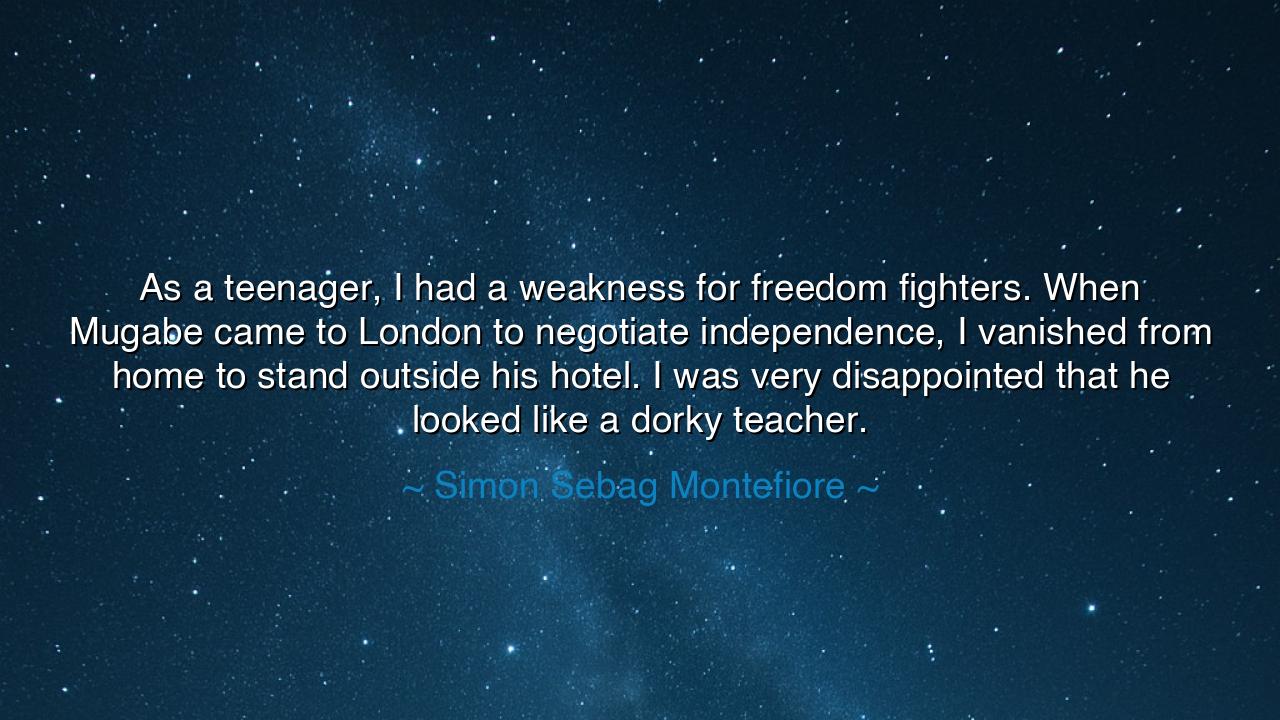
As a teenager, I had a weakness for freedom fighters. When Mugabe
As a teenager, I had a weakness for freedom fighters. When Mugabe came to London to negotiate independence, I vanished from home to stand outside his hotel. I was very disappointed that he looked like a dorky teacher.






The words of Simon Sebag Montefiore speak with the nostalgia of youth and the disillusionment of maturity. “As a teenager, I had a weakness for freedom fighters. When Mugabe came to London to negotiate independence, I vanished from home to stand outside his hotel. I was very disappointed that he looked like a dorky teacher.” In this reflection lies a parable of all ages — the story of how idealism meets reality, and how the fire of youth, once enchanted by heroes, must one day learn the deeper nature of freedom, power, and human imperfection. It is not merely the recollection of a historian, but a confession of the universal journey from innocence to understanding.
In his youth, Montefiore, like many souls awakening to the struggles of the world, felt drawn to those who bore the banner of liberation. To the young, freedom fighters appear as gods in flesh — brave, noble, pure in purpose, untainted by the corruption of politics. They are the living embodiment of resistance, the very image of justice striking against tyranny. But when the young Simon stood waiting outside the hotel to glimpse Robert Mugabe, he was not just seeking a man; he was seeking a symbol — the embodiment of the revolutionary spirit he had read about in books and heard about in newsreels. Yet when the hero appeared not as a warrior or prophet, but as an ordinary man in spectacles and a teacher’s coat, the illusion cracked. Reality revealed what youth so often forgets: that greatness does not always wear glory’s garments.
The origin of this quote lies in a moment of transformation — when admiration meets disappointment and becomes wisdom. In the late 1970s, Robert Mugabe was seen by many across the world as a symbol of hope for Zimbabwe’s independence, a man fighting colonial oppression with intellect and resolve. To a young idealist in London, he must have seemed like a modern Moses leading his people to freedom. Yet, history would later reveal that this same man, once hailed as a liberator, would descend into authoritarianism and cruelty, betraying the very ideals he once stood for. Thus, Montefiore’s youthful disillusionment proved prophetic — the “dorky teacher” would become a tyrant, and the “freedom fighter” would enslave his own people.
This story reflects a truth older than nations: that revolutions, though born in fire and righteousness, often end in shadow. The annals of history are filled with those who began as saviors and ended as oppressors. From Napoleon Bonaparte, who rose to defend liberty only to crown himself emperor, to Lenin and others who built revolutions upon dreams and turned them into prisons — humanity repeats the same cycle of worship and disappointment. The youthful heart craves heroes, but wisdom learns that no man is greater than the ideals he proclaims, and that those who fight for freedom must first conquer the tyrant within themselves.
And yet, Montefiore’s tone is not bitter, but reflective. His “weakness for freedom fighters” is not something to mock, but something to cherish — for it reveals that the passion for justice is a fire that belongs to the best of human nature. Without such fire, there would be no revolutions at all, no progress, no breaking of chains. The disappointment that follows is the price of awakening, the cost of learning that heroes are human. The wise do not abandon idealism after such disillusionment; they refine it. They learn to love principles more than personalities, and truth more than myth.
There is an ancient lesson here, echoed by philosophers and prophets alike: never worship the image of a hero, but the idea of virtue itself. True freedom fighters are not those who appear grand or charismatic, but those who remain faithful when no one is watching — those whose strength lies in discipline, humility, and compassion. A leader who looks like a “dorky teacher” may yet wield more quiet courage than a thousand men with rifles. Appearances deceive; it is the soul’s integrity that determines a person’s greatness.
Thus, Montefiore’s youthful disappointment becomes our timeless reminder. The path to wisdom begins when we cease seeking perfect saviors and instead strive to live the ideals we admire in others. Every generation will have its heroes and its disillusions, but each must learn anew that liberation is not the gift of a single man, but the labor of many hearts. Let us then be inspired not by faces, but by virtues — by the courage to question, the honesty to doubt, and the perseverance to continue building freedom even after the idols of our youth have fallen.
For in the end, the truest freedom fighter is not the one who shouts loudest in the streets or stands highest on the stage, but the one who, in quiet and steadfast integrity, continues to fight against ignorance, injustice, and despair — both in the world and within the self. And when youth grows into age, as Montefiore did, let it not lose its “weakness” for freedom, but learn to temper passion with wisdom, and hope with discernment. For that is how humanity moves — not from disillusionment to cynicism, but from wonder to understanding, and from understanding to truth.






AAdministratorAdministrator
Welcome, honored guests. Please leave a comment, we will respond soon